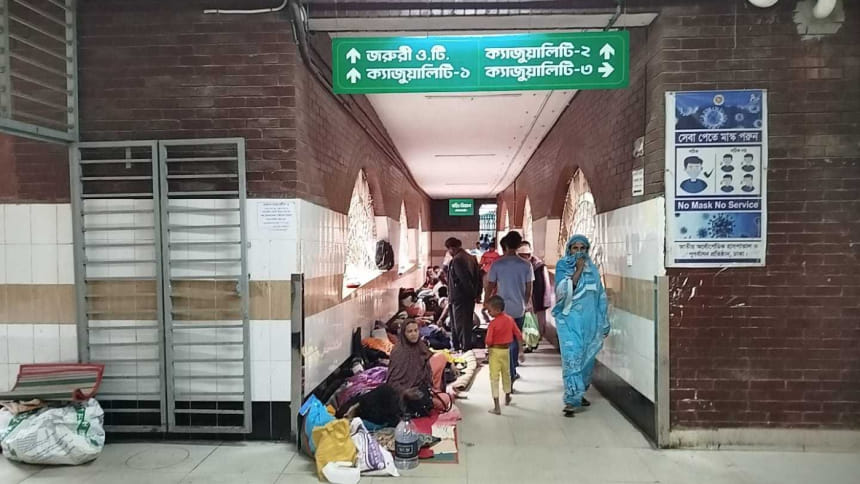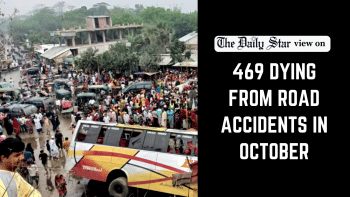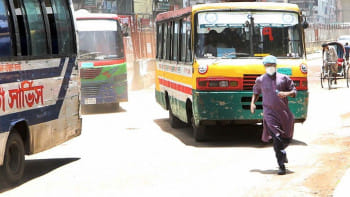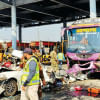Surge in road crashes: Patient overflow pushes NITOR beyond capacity

The National Institute of Traumatology & Orthopaedic Rehabilitation (NITOR) is struggling to manage an overwhelming number of patients, far exceeding its 1,000-bed capacity, leaving many to receive treatment on the floor or in overcrowded corridors.
As of Saturday, the hospital reported over 1,100 patients, an increase from 1,069 on Friday.
Most cases involve road accident victims, alongside others injured in falls or various accidents.
During a visit yesterday, 70-year-old Ahsan Ullah, a grocery shop owner from Narayanganj, was found lying on the floor near the emergency operation theatre.
He was hit by a motorcycle last Monday while crossing the road, resulting in a fractured left leg and injuries to his right arm.
Despite arriving at the hospital the same night, he remains on the floor awaiting surgery. "We came here immediately, but there's no space," said his daughter, Khadija Begum.
Yasmin Begum, 35, from Sunamganj, suffered a severe injury to her right leg after being run over by a bus near Jamuna Future Park yesterday while attempting to board. She was seen waiting on a stretcher near the emergency room, awaiting surgery.
On Saturday, 55-year-old Babul Hossain, a vegetable vendor from Lakshmipur, was found lying on the floor.

He suffered a broken leg after being hit by a motorcycle on December 18 and came to NITOR on December 26. Despite requiring surgery, he remains on the floor after receiving primary treatment due to the severe bed shortage.
"I've begged the staff for help, but they told me there's none. How long can we wait like this?" said his wife, Sajeda Begum.
Similarly, Mohammad Nannu, a 35-year-old battery-driven auto-rickshaw driver from Kurmitola Bihari Camp, sustained a left leg fracture in a road accident on December 26.
He was being treated on the floor, but on Friday, he received a bed and underwent surgery to insert a rod in his leg.
However, he was told to leave the hospital due to the bed crisis. "They told me I had to go home because others needed the space more. However, I've been asked to come back every three days to dress my wounds," he said.
One-year-old Mohammad Rafi from Narsingdi fractured his left leg on December 25. Despite being admitted, he has been lying on the floor near the emergency operation theatre.
"We brought him here immediately, but there were no beds available. It breaks my heart to see him on the floor, but we have no option but to wait," said Tania Akter, Rafi's mother.
Seven-year-old Al Amin, a madrassa student from Netrokona, fractured both arms and his left leg after falling from a tree.
He is in critical condition. His mother, Shahida Begum, pleaded for a bed but was told to be grateful for the floor treatment.
"We came all the way from Madan, Netrokona, hoping he'd get proper care. But dust is entering his wounds while he lies on the floor. I don't know anyone here, and I feel so helpless," she said.
Seventy-year-old Arifa Begum fractured her hip in a fall inside the bathroom on October 7 and was brought to the hospital by her family from Gazipur's Kaliganj.
Initially unable to afford the surgery, they had to return home untreated. With her condition worsening, they returned to the hospital, and now her daughter Parul Begum says they've been waiting for six days without admission.
"We've spent nights sitting on the floor, and my mother is in terrible pain. We are forced to keep her in the corridor while waiting for a bed," Parul said.
The overcrowding has turned hospital corridors into makeshift treatment zones. Staff are struggling to move trolleys and equipment, with patients lying along the floors from the emergency department to the operation theatre.
A nurse at the hospital said they are forced to discharge patients early to manage the influx. "Patients who need 15 days of care are being sent home after 7-8 days. It's not ideal, but we have no choice," she said.
Dr Md Abul Kenan, director of NITOR, acknowledged the crisis. "Very recently, patient numbers have surged, particularly road accident victims from all over the country. On Friday, we had 1,069 patients, and by Saturday, it exceeded 1,100," he said. "While treating patients on the floor is not standard practice, we are trying our best to ensure no one is sent back untreated."
A senior official, speaking anonymously, said, "For every 10 discharges, 20 new patients arrive. Some patients stay for months, and it's impossible to maintain empty beds for emergencies. We are forced to discharge those who can manage follow-ups at home."


 For all latest news, follow The Daily Star's Google News channel.
For all latest news, follow The Daily Star's Google News channel. 








Comments